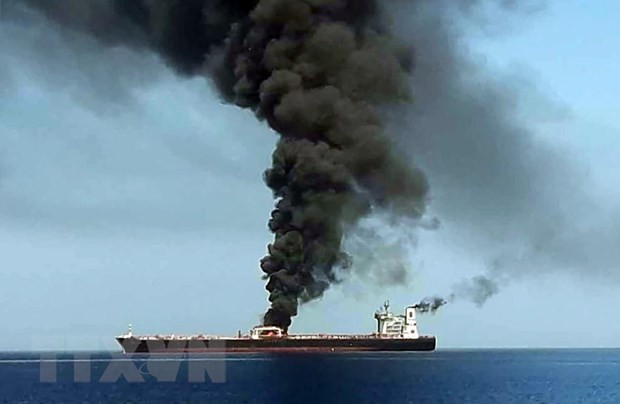Russia accuses the US of increasing tensions in the Gulf of Oman
The Russian Foreign Ministry on June 14 accused the United States of escalating tensions in the Middle East with accusations against Iran in suspected attacks on oil tankers in the Gulf of Oman.
 |
| Smoke billows from an oil tanker believed to have been attacked off the coast of the Gulf of Oman on June 13. Source: AFP/TTXVN |
The Russian Foreign Ministry on June 14 accused the United States of escalating tensions in the Middle East with accusations against Iran in the suspected attacks on oil tankers in the Gulf of Oman on June 13, and warned against hasty apportionment of responsibility.
In a statement issued after President Donald Trump blamed Tehran for the attacks, the ministry said the US's "Iran phobia" had artificially fueled tensions. It also called on all parties involved to exercise restraint.
Russia's Foreign Ministry said Moscow strongly condemned the attacks in the strategic Strait of Hormuz, but warned against criticizing anyone until a "comprehensive and impartial international investigation" had been completed.
Moscow also expressed gratitude to Iran for its efforts to rescue 11 Russian citizens, who were part of the crew of one of the attacked oil tankers.
On the same day, Acting US Defense Secretary Patrick Shanahan said that President Donald Trump's administration is focusing on building international consensus after attacks on oil tankers in the Middle East.
Speaking to reporters outside the White House, Mr. Shanahan said the Pentagon’s role in the effort included intelligence sharing. Earlier, the U.S. Central Command released a video that it said showed Iranian forces removing an unexploded mine attached to the hull of one of the tankers.
In its response, Iran asserted that the video released by the US proves nothing and is just an excuse for the US to blame. Iranian Foreign Ministry spokesman Abbas Mousavi said: "These allegations are alarming."
Iranian Foreign Minister Javad Zarif accused Washington of trying to sabotage diplomatic efforts as Japanese Prime Minister Shinzo Abe visited Iran to mediate current tensions in the Middle East.
The June 13 incident raised fears of a confrontation in the vital shipping lane for global oil at a time of rising tensions between the United States and Iran over sanctions and US military moves in the Middle East.
Tehran and Washington both say they have no interest in starting a war, but this has done little to allay concerns that the old rivals could plunge into conflict./.

